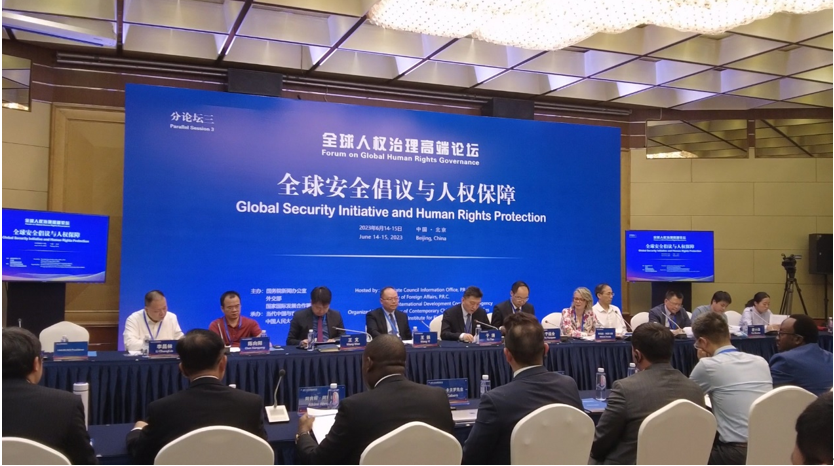Fostering global partnerships to advance human rights: Experts
- By Wang Yiming
 0 Comment(s)
0 Comment(s) Print
Print E-mail China.org.cn, June 17, 2023
E-mail China.org.cn, June 17, 2023

A parallel session of the Forum on Global Human Rights Governance held in Beijing, June 14, 2023. [Photo by Wang Yiming/China.org.cn]
This year marks the 30th anniversary of the adoption of the Vienna Declaration and Programme of Action, which emphasizes the importance of international cooperation in promoting global human rights development and governance. Several speakers at the Forum on Global Human Rights Governance, held in Beijing this week, advocated for worldwide collaboration in this domain.
Nathali C. Berríos Marrero, a lawyer with the Ministry of People's Power for Foreign Affairs of Venezuela, highlighted the significance of the Vienna Declaration and Programme of Action, noting that "strengthening international cooperation for the benefit of human rights contributes to the realization of the purposes of the United Nations." She also praised the Global Development Initiative presented by China during the U.N. General Assembly in 2021 as a successful step in jointly promoting development.
Woo Su-Keun, chairman of the Korea-China Global Association, also stressed the importance of international cooperation in global human rights governance. He called for countries to recognize and respect different views on human rights while building on universal standards, stating that "international cooperation is very important so as not to be too biased toward human rights views in a specific region or country."
Woo suggested reorganizing and reforming systems of international human rights organizations, such as the U.N. Human Rights Council and Amnesty International, to better suit the current era. He also stressed the need for "strengthening human rights governance, an international system for protecting and promoting human rights."
Luo Yanhua, a professor at the School of International Relations at Peking University, discussed China's active advocacy and practice of international cooperation in the field of human rights.
China has proposed a draft resolution on "promoting win-win cooperation in the field of human rights" at the U.N. Human Rights Council on three occasions. Luo mentioned that China has joined 26 important international human rights treaties, including six core U.N. human rights treaties.
She also talked about China's other contributions to international human rights cooperation, such as hosting and institutionalizing the South-South Human Rights Forum, which provides a high-end platform for international human rights cooperation and exchange among developing countries.
Zhang Yonghe, executive dean of the Human Rights Research Institute of Southwest University of Political Science and Law, pointed out that China has consistently supported the enhancement of international cooperation in the realm of human rights and taken practical actions to encourage the development of global human rights governance toward greater fairness, justice, reasonableness and inclusivity, contributing Chinese wisdom, Chinese solutions and Chinese strength.
The concept of building a community with a shared future for mankind, as proposed by China, has become a significant component of the international human rights discourse system, Zhang said.
He further asserted that every nation has the right to independently choose its own path for human rights development and that the promotion of international dialogue and cooperation in the field of human rights should be stressed.






Go to Forum >>0 Comment(s)